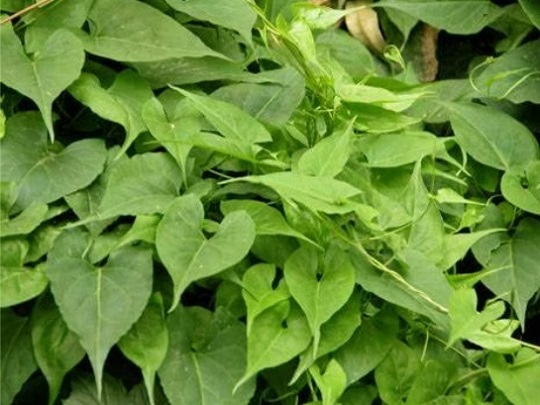Powerful Compound in Traditional Chinese Herb Found to Reverse Aging and Protect Against Multiple Diseases
Nikhil Prasad Fact checked by:Thailand Medical News Team Apr 05, 2025 3 weeks, 2 days, 2 hours, 54 minutes ago
Medical News: Ancient Herbal Compound Shows Modern Promise for Anti-Aging and Disease Protection
Scientists from the College of Basic Medicine and the College of Pharmacy at Guizhou University of Traditional Chinese Medicine in China have published a groundbreaking review highlighting the incredible anti-aging properties of a powerful natural compound known as 2,3,5,4'-Tetrahydroxystilbene-2-O-β-D-glucoside or TSG. This bioactive molecule is derived from Polygonum multiflorum Thunb, a traditional Chinese medicinal herb also known as He Shou Wu or Fo-ti, and has shown remarkable effects in not just extending lifespan but also protecting the brain, heart, bones, and reproductive organs.
 Powerful Compound in Traditional Chinese Herb Found to Reverse Aging and Protect Against
Powerful Compound in Traditional Chinese Herb Found to Reverse Aging and Protect Against
Multiple Diseases. Image: Polygonum multiflorum Plant
This
Medical News report explores the systematic review conducted by the researchers, which compiled data from over 100 scientific studies and focused particularly on the last five years of research. TSG, often extracted from the root of Polygonum multiflorum, appears to be a natural multitasker, with studies showing its ability to reduce inflammation, oxidative stress, and cell death, while improving mitochondrial function, stem cell activity, telomerase function, and even epigenetic regulation.
Lifespan Extension and Brain Protection
In animal models like zebrafish and Caenorhabditis elegans, TSG has been shown to significantly extend lifespan. For example, in aging zebrafish, TSG reduced the buildup of harmful reactive oxygen species (ROS), decreased inflammation, and boosted the levels of key antioxidant enzymes. In worms, it increased average lifespan by over 16 percent and improved resistance to stress through regulation of mitochondrial health.
TSG’s neuroprotective effects were even more striking. It improved cognitive performance in Alzheimer’s and Parkinson’s disease models by blocking the buildup of harmful proteins, reducing brain inflammation, and protecting neurons from death. It also increased important brain chemicals like BDNF and GDNF, which support learning and memory, and enhanced the brain’s ability to repair itself by activating genes involved in cell survival.
Heart Health and Blood Vessel Protection
TSG was shown to combat atherosclerosis and high blood pressure - two major causes of heart disease. It did this by lowering cholesterol, improving blood vessel flexibility, increasing nitric oxide levels, and calming inflammation. It also helped reduce harmful plaque buildup in the arteries and prevented blood vessels from aging prematurely.
In studies involving genetically engineered mice, TSG regulated important genes linked to fat metabolism and immune function. It even helped reshape gut microbiota - an emerging factor in heart and immune health.
Protecting Bones and Hormonal Health
In osteoporosis models, TSG
strengthened bones by increasing mineral density and promoting the formation of new bone cells while reducing bone breakdown. It activated key pathways that support bone growth and even helped combat bone loss related to diabetes.
When it came to reproductive health, TSG helped rejuvenate aging ovaries and testes. In female mice, it preserved the number and quality of eggs, boosted estrogen levels, and improved mitochondrial function. In male models, it protected testicular cells from aging and oxidative damage.
Other Benefits Including Hair Growth and Chemotherapy Recovery
TSG also showed benefits in reversing hair loss. In lab animals, it promoted hair regrowth by reducing cell death in hair follicles. Moreover, it helped restore blood cell counts and protect stem cells in rats receiving chemotherapy - suggesting potential in reducing side effects from cancer treatment.
Even in conditions of overeating or metabolic stress, TSG protected the liver and kidneys, improved motor function, and prevented organ damage. It worked through the AMPK/SIRT1/PGC-1α pathway - one of the key regulators of aging and energy metabolism.
Final Thoughts and Scientific Caution
TSG has emerged as a highly promising natural molecule with wide-ranging benefits across multiple organ systems. It targets almost all known hallmarks of aging including chronic inflammation, oxidative damage, mitochondrial dysfunction, telomere shortening, stem cell depletion, and even imbalanced gut microbiota. These effects are especially appealing because they align with holistic principles found in traditional Chinese medicine.
However, researchers caution that most of the studies so far have been preclinical, involving cells or animal models. More rigorous human trials are needed before TSG can be widely recommended as a treatment. Additionally, standardizing the dosages and understanding how TSG interacts with other herbal compounds in Polygonum multiflorum is essential. There's also a need to explore how this compound can be integrated into mainstream clinical care beyond China.
Ultimately, TSG represents one of the most exciting natural compounds in the field of anti-aging medicine today, but clinical validation remains a key hurdle.
The study findings were published in the peer reviewed International Journal of Molecular Sciences
https://www.mdpi.com/1422-0067/26/7/3381
For the latest on Anti-Aging, keep on logging to Thailand
Medical News.
Read Also:
https://www.thailandmedical.news/news/new-discovery-on-epitalon-the-bioactive-pineal-tetrapeptide-that-may-hold-the-key-to-anti-aging-and-longevity
https://www.thailandmedical.news/news/american-study-finds-that-the-herb-centella-asiatica-promotes-healthy-aging-by-inducing-distinct-dna-methylation-changes
https://www.thailandmedical.news/news/research-from-taiwan-shows-that-a-lychee-based-phytochemical-could-help-with-age-related-muscle-loss
https://www.thailandmedical.news/articles/anti-aging
https://www.thailandmedical.news/news/korean-murine-study-shows-that-thymus-quinquecostatus-celakovski-can-possibly-enhance-testosterone-levels-in-aging-men
https://www.thailandmedical.news/pages/thailand_doctors_listings
